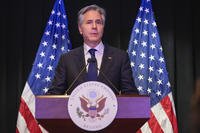Three of the country's leading veterans' service organizations said they're generally pleased with the Veterans Affairs Department's budget request for next year but are concerned the department is moving too quickly to provide health care outside of VA facilities.
Al Kovach Jr., president of the Paralyzed Veterans of America, which teams with Veterans of Foreign Wars and Disabled American Veterans to draft an independent VA budget each year, said the groups understand the desire to leverage community medical services to make sure veterans' needs are met. But the groups believe the VA is moving too quickly to develop private care options.
"VA needs to ensure that it devotes critical resources to expand internal capacity, and increase staffing in the existing health care system, particularly for specialized services such as spinal cord injury or disease," Kovach said.
Overall, the VA is requesting $182.3 billion for fiscal 2017. The figure includes more than $78 billion in discretionary funding, mostly for health care, and nearly $104 billion for mandatory programs such as disability compensation and pensions.
The department is also proposing to establish a new Medical Community Care budget item with $7.2 billion from the existing medical services account and nearly $5 billion from funds appropriated for the 2014 Choice Act.
Carl Blake, the Paralyzed Veterans of America's executive director for legislative affairs, told Military.com on Friday that all the veteran service organizations recognize the importance of providing care to veterans within the community when it's the right kind of service.
"To make it work will mean making the VA health care system an integrated healthcare network, with the VA as the core and the community [providers] as part of that network," he said.
That means partnering with providers and facilities able to meet veterans' specific needs, rather than general medical providers, Blake said. This kind of care is not duplicated in the civilian sector, he said.
"You can't ignore the fact that specialized care such as mental health, blinded [care] and spinal cord injuries do not develop in a vacuum," Blake said.
Veterans groups and lawmakers have been aware for some time of the need to provide services to veterans within their communities or closer to their homes. Congress, for example, has passed legislation authorizing more veterans to get health care locally in cases where VA facilities are more than 40 miles from their homes.
--Bryant Jordan can be reached at bryant.jordan@military.com. Follow him on Twitter at @bryantjordan.





























